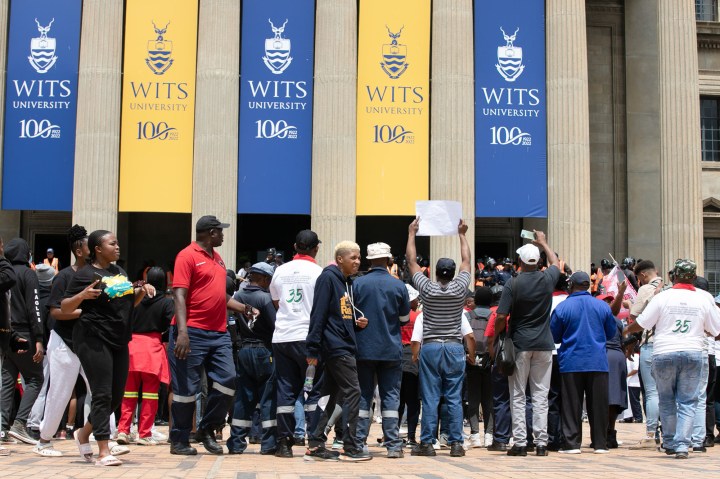CAMPUS STRIFE
Universities and SRCs still working to find solutions to NSFAS-funded students’ housing crisis

Once again, the start of this academic year was marked by protests at universities across South Africa — mainly over the R45,000 accommodation cap set by the National Student Financial Aid Scheme. Are there any long-term solutions to ensure the cycle of protest does not keep repeating?
At the start of the academic year in 2023, students across South Africa protested over the increasing financial burden of higher education. The biggest gripe was the National Student Financial Aid Scheme’s (NSFAS’s) decision to cap accommodation allowances at R45,000 per annum, which exacerbated the financial plight students already faced. Additionally, many institutions instituted a “fee block” policy wherein students who have accumulated historic debt are denied registration.
At the University of Cape Town (UCT), students began protesting on 13 February — the first day of the academic year — after their Students’ Representative Council (SRC) announced a campus shutdown and encouraged the suspension of academic activity. Students demanded that UCT provide housing for all unhoused students affected by the NSFAS accommodation caps. Additionally, students sought the lifting of fee blocks and a review of the university’s financial exclusion policies.
The protests spread to other campuses. At the University of Pretoria (UP), students slept outside the university’s residences on February 16 as part of a demonstration against the housing crisis. At the University of Witwatersrand (Wits), students took to the streets of Braamfontein on March 2 to voice similar concerns over unhoused students and financial exclusion.
Universities responded by engaging in negotiations and mediation processes with their SRCs. Some students criticised the way in which university management handled protests, especially at UCT where a heavy police presence was deployed on March 10 after an interdict attained by the university.

A student shouting at security to open the gate during a protest at Witwatersrand University on 3 March 2023 in Johannesburg, South Africa. It is reported that the students are protesting against financial exclusion and the lack of accommodation. (Photo: Gallo Images / Fani Mahuntsi)
At Wits, a heavy security presence was also criticised by students, who claimed they were harassed by campus security services. Both universities condemned excessive violence and invited students to report incidents of harassment.
In a statement released on March 17, UCT announced it had come to an agreement with the SRC to “conduct a review in respect of its fee policy”.
Wits also committed funding to help students register and find emergency accommodation. On March 10, the university announced it would commit R28-million “to assist qualifying students to register and to secure emergency accommodation”.
At UP, SRC Secretary-General Phenyo Matabane said they were working on solutions to find housing for NSFAS-funded students.

University of Cape Town (UCT) students protest on 12 March 2021 in Cape Town, South Africa. (Photo: Gallo Images / Brenton Geach)
Read more in Daily Maverick: South African students still battling debt despite protests and promises
“On the meeting we had with management, as it stood, the favourable solution from management’s side was to send an appeal to NSFAS again to be exempt from the R45,000 cap,” said Matabane.
“However, the university opened accreditation for more privately owned residences to apply to be accredited to house NSFAS students which is one of the resolutions the UP SRC proposed to management.”
As UP noted, the NSFAS accommodation cap not only exacerbated the financial burden of students but of institutions too.
“The University of Pretoria is disappointed in NSFAS’s rejection of the exemption application made by the university. This means NSFAS will continue to implement the R45,000 cap on accommodation funding and in the process shift the financial burden on to students and the university, which are already experiencing financial strain.”
NSFAS spokesperson Slumezi Skosana explained to Daily Maverick that the R45,000 cap was an informed decision that was based on research the organisation conducted into the costs of student accommodation.
Skosana also pointed to alleged price gouging and collusion amongst accommodation providers, leading to unreasonable costs of student housing. In a statement on 23 February, NSFAS said, “If this matter is not confronted urgently by all stakeholders, student accommodation will simply be unaffordable for many and so will be education.”
On 17 March, NSFAS announced that it would increase living allowances by 10% as “an effort not only to acknowledge the impact of inflation on students’ livelihood but a contribution to ease the economic disadvantages suffered by students”.
In that statement, Higher Education Minister Blade Nzimande said: “This is a significant development given the reality that in the past three years, no increment was made on student allowances. This is an effort not only to acknowledge the impact of inflation on students’ livelihood but a contribution to ease the economic disadvantages suffered by students.”

UCT students protested at the Bremner Building Middle Campus at University of Cape Town (UCT) on 10 March 2023 in Cape Town, South Africa. (Photo: Gallo Images / Brenton Geach)
Not enough, say students
Though the living allowances have increased and institutions have agreed to review financial exclusion policies as best they can, many students have acknowledged that this is not enough to alleviate the financial burden.
On Tuesday, 28 March, a group of students, including many from the EFF Students Command (EFFSC), marched to the Halyard Building, where the NSFAS head offices are in Cape Town, to express their concerns.
The EFFSC noted that “many student accommodation providers still charge well above R60,000 per annum. Once a student is accepted by NSFAS, that on its own is a confirmation and affirmation from the government that that particular student cannot afford higher education. Therefore, to make this assessment, but at the same time provide to the very student below what is needed and requirement for their education achieves nothing other than setting students up for failure.”
Long-term solutions
Universities South Africa (USAf) told Daily Maverick: “USAf’s chief executive officer and spokesperson, Dr Phethiwe Matutu, has repeatedly said that the annual crises precipitated by inadequate student funding can never be resolved by universities on their own. This is a societal issue, to which the state needs to bring about a long-term and sustainable solution.
“In 2017, the government announced a fee-free higher education system which turned the previous loan-based NSFAS into a full bursary scheme. But that scheme caters for students whose total annual household income is R350,000 or below. Students whose parents/guardians earn a rand above that are excluded.”
USAf hopes that students within the missing middle can be catered to and they are looking to the state “to find an all-inclusive sustainable solution that will cater for those in the missing middle while addressing the gaps evident in the NSFAS model”.
When asked what interventions could be applied to prevent a repeat in 2024, USAf stated that in June 2021, the Minister of Higher Education, Science and Innovation appointed a Ministerial Task Team (MTT) to review the sustainability of the post-school education and training student financial aid system.
USAf was consulted on the high-level recommendations of this MTT in October 2022, before they could be presented to Cabinet.
“We remain waiting to hear Cabinet’s final decision on these recommendations, which, we hope, will offer a more sustainable funding solution and put the annual funding-related protests to a final rest.” DM



















Comments - Please login in order to comment.